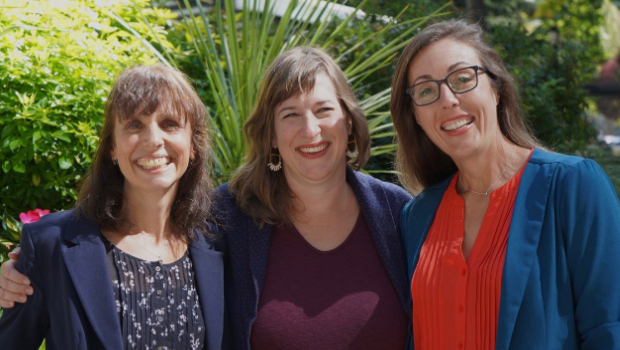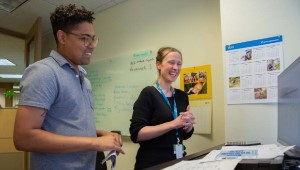New center focuses on equitable, whole-person health care

ACT Center co-directors Paula Lozano, Katie Coleman, and Emily Westbrook (photo: Melissa Parson)
Kaiser Permanente launches the ACT Center, the new Center for Accelerating Care Transformation
The MacColl Center for Health Care Innovation and the Learning Health System, both part of Kaiser Permanente Washington Health Research Institute (KPWHRI), have joined together in the service of equity and population health to create the Center for Accelerating Care Transformation.
The ACT Center will support health systems to achieve large-scale improvements in care delivery by:
- Strengthening and streamlining the path from research to practice, serving as a bridge between researchers and health system leaders to improve patient care
- Elevating the voice of patients, families, and communities in the design, dissemination, and application of research
- Building connections that bring researchers and care delivery systems together with the shared goal of providing equitable, whole-person care that improves health, with a special focus on underserved populations, including those with social needs
“Coming together to create this new center presents a unique opportunity to leverage Kaiser Permanente’s historic investments in health care transformation,” said Rita Mangione-Smith, MD, MPH, vice president of Research and Health Care Innovation for Kaiser Permanente in Washington and executive director of KPWHRI. The center brings together evidence-based, patient-centered, data-driven research with care transformation work that has been conducted with community partners nationwide for decades.
“Moving the needle in authentic ways on equity will require deep relationships between community and research,” said Andrea Ducas, a senior program officer from the Robert Wood Johnson Foundation — a longtime funder of the MacColl Center. “We are confident ACT Center is thinking about what that means from a system transformation perspective.”
Wide-ranging impact
The ACT Center’s Integrated Pain Management (IPM) program is an example of how the ACT Center partners with patients to improve care. The goal is to improve quality of life, functioning, and overall health and well-being for people with chronic pain by providing safe alternatives to opioids and increasing the use of evidence-based, nonpharmacologic treatments.
Kaiser Permanente member Starette Canada joined the IPM team as a patient partner. “Too often people in pain become the unseen, and their pain is classified as exaggerated, rather than as a person who needs help. The IPM project melds data and first-person research, an approach that avoids stigma,” said Canada. “IPM allowed me to plan and prepare for my pain, rather than ignore or pretend it doesn’t exist. I started tracking my diet and exercise and used a chart to track my outlook for a healthier life. In week one, my chart revealed a 15% to 20% reduction in voicing pain, and by week 7, a 60% reduction in pain in addition to a healthier life.”
Another example of how the ACT Center supports health systems to achieve improvements in care delivery is the development and implementation of the Community Resource Specialist (CRS) in primary care. CRSs provide health and wellness support to patients and connect them to community-based resources for social needs such as housing, transportation, parenting support, and healthy food access. This role, led by the new ACT Center, is strengthening community connections to KP members.
The CRS role was originally developed as part of a pilot study at KPWHRI, funded by the Patient Centered Outcomes Research Institute. To test the CRS role, the pilot study team brought together 2 patient co-investigators with patients in the design and evaluation of the project, and partnered with 2 KP Washington clinics. As a result of the pilot’s success, KP Washington placed CRSs in all its primary care clinics and partnered with the ACT Center to optimize implementation of the CRS role systemwide.
The ACT Center also evaluated the role's impact on patients and care teams, to inform next steps. The evaluation found that patients who had 2 or more CRS encounters reported positive changes and were very satisfied with the service. It also found that the CRS role can help address many unmet social needs for many patients, but that patients may need significant support to overcome barriers to accessing resources and the stigma of asking for help. Overall, the evaluation found that the CRS role is valued by patients and care teams alike.
Based on these results, the ACT Center team recommended that KP Washington routinely use social health screening as a way to reach more members in need and to normalize social health as a part of total health. Now, the team is working with KP Washington leaders, care teams, and members to co-design and test a patient-centered approach to conducting universal social health screening.
“In the face of the pandemic and other social challenges and injustices, we are proud to engage our members and community to provide the best care possible at Kaiser Permanente in Washington,” Dr. Mangione-Smith said. “As a health care leader, it is our job to ensure equitable, whole-person care, and the opening of the ACT Center represents just that.”
The ACT Center’s co-directors are 3 longtime leaders of KPWHRI:
- Katie Coleman, MSPH, director of KPWHRI’s MacColl Center for Health Care Innovation
- Paula Lozano, MD, MPH, Kaiser Permanente Washington medical director for Research and Translation
- Emily Westbrook, MHA, KPWHRI director of Research Operations and Programs
The ACT Center will also serve as the coordinating center of Kaiser Permanente’s Social Needs Network for Evaluation and Translation.
To learn more about the ACT Center, please visit act-center.org.
About Kaiser Permanente
Kaiser Permanente and Kaiser Foundation Health Plan of Washington are committed to helping shape the future of health care. We are recognized as one of America’s leading health care providers and not-for-profit health plans. Founded in 1945, Kaiser Permanente has a mission to provide high-quality, affordable health care services and to improve the health of our members and the communities we serve. We currently serve approximately 12.5 million members in 8 states and the District of Columbia. Care for members and patients is focused on their total health and guided by their personal Permanente Medical Group physicians, specialists, and team of caregivers. Our expert and caring medical teams are empowered and supported by industry-leading technology advances and tools for health promotion, disease prevention, state-of-the-art care delivery, and world-class chronic disease management. Kaiser Permanente is dedicated to care innovations, clinical research, health education, and the support of community health.
Researchers
,
Paula Lozano, MD, MPH
Senior Investigator; Director, ACT Center
Healthy Findings Blog

Decades in the making: A look back at what makes MacColl, MacColl
MacColl Center co-founder Brian Austin, who is retiring this week, reflects on how the Center became a global pioneer in health care transformation.
Healthy findings blog

A practical roadmap to guide learning health systems
Claire Allen shares how a new paper from our LHS Program can help learning health systems move from concept to reality.
healthy findings blog

Partnering to advance lifesaving care
Amy Lee describes how the LHS Program is helping KP Washington track and improve treatment for opioid use disorder.
news

KPWHRI to lead network to address social needs
Katie Coleman and Cara Lewis will co-direct a national network that supports work to address members’ social health.


